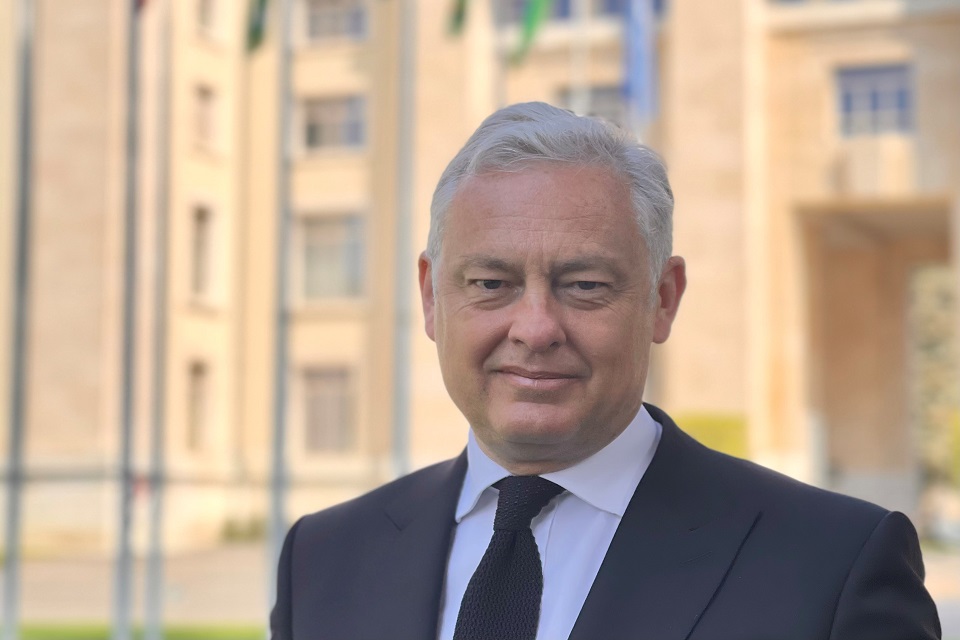Brazil WTO Trade Policy Review: UK statement
The UK's Permanent Representative to the WTO in Geneva, Ambassador Simon Manley, gave a statement during Brazil鈥檚 8th WTO Trade Policy Review.

Chair, let me warmly welcome Brazil鈥檚 delegation, led by Minister Fernando Meirelles de Azevedo Pimentel to their eighth Trade Policy Review [TPR].
Let me also thank the Government of Brazil and to the WTO Secretariat for their Reports and, in particular, to you, Chair and Discussant, for your insightful comment.
Chair, following Brazil鈥檚 recent federal elections, we look forward to continuing to work together constructively with the incoming government to find bilateral opportunities and to advance progressive multilateral solutions, including here at the WTO.
In our written questions for this review, the UK was keen to gain a deeper understanding regarding Geographical Indications, import and customs requirements, environmental and sustainability measures, and government procurement.
As Brazil鈥檚 2017 TPR and the Secretariat Report for this review note, Brazil remains a somewhat inward-oriented economy. However, we were pleased to note developments in the modernisation of Brazil鈥檚 economy and commend Brazil鈥檚 clear commitment and actions here to reaffirm the WTO as a central pillar of global economic governance and its impressive role within the multilateral trading system. Let me also recognise Brazil鈥檚 active engagement on all the Joint Statement Initiatives.
Chair, we are encouraged by Brazil鈥檚 ongoing openness to international investment. We agree with Brazil that economies, like the multilateral trading system itself, should function as an instrument to improve the lives of everyone, and that investors depend on predictability and stability.
As such, there are key opportunities for Brazil and the UK to build on common ground. For instance, the UK Global Tariff, which came into effect in January this year, has secured over 拢2 billion of import value by unilaterally removing barriers to green trade. This measure supports wind turbine components, renewable energy generation, and advancing carbon capture innovations and research. This measure reflects the importance of trade in greening the global economy, as highlighted in Director General Ngozi鈥檚 recent comments at COP 27 and in the WTO World Trade Report. Trade must be a cornerstone of climate action.
Similarly, to grow international trade, UK Export Finance offers a dedicated 拢2 billion clean growth direct lending facility, and long-term financing (up to 18 years indeed for renewable energy projects) to provide a safety net for businesses investing in this area.
Turning to new trade policy developments, we are proud to support Brazil to be the first Latin America country to have a digital marketplace of export services tailor-made for MSMEs鈥� needs, which is based on the United National Centre for Trade Facilitation and Electronic Business integrated services for MSMEs in international trade.
We also note that the BRAEXP platform [a new service for Brazilian鈥檚 exporters] is due to be fully developed by March 2023 and we look forward to seeing the trade-facilitating benefits which it will undoubtedly provide.
Chair, let me also pay tribute to Brazil鈥檚 commitment to the trade facilitation agenda. Through the Trade Facilitation in Middle Income Countries programme, we were glad to support the World Bank Group and the World Customs Organization to deliver to Brazil a Time Release Study, a WTO Trade Facilitation Agreement Gap Assessment, a Trade and Gender Survey, and a Poverty Impact Assessment.
We encourage Brazil to keep implementing the solutions identified in those deliverables. These will enhance transparency and improve the effectiveness of international trade procedures, ensuring that benefits are reaped regardless of socio-economic status, ethnicity, or gender.
We are also pleased that the Secretariat鈥檚 Report notes that Brazil has eliminated important duties on certain aeronautical goods and has implemented tariff reductions in response to the COVID-19 pandemic. Those measures demonstrate flexibility and an openness to international trade, and we encourage Brazil to implement further, similar, outward-looking, open measures.
Regarding Geographic Indication [GI], the UK particularly welcomes Brazil鈥檚 recent commitment to progress the UK鈥檚 application for the protection of GI鈥檚 in relation to Scotch Whisky, cheers. We are pleased with the progress which we have made on a double taxation agreement to boost trade and investment between our 2 countries.
We were also glad to share with Members that last Thursday 17 October we completed negotiations with Brazil on the UK Goods Schedule at the WTO, a great step in our bilateral relationship. Earlier this year, we welcomed the OECD Council鈥檚 unanimous invitation to Brazil to start on the path towards formal organization membership, a process which will surely prosper in the capable and oh-so-elegant hands of Ambassador Parola. Geneva鈥檚 loss is undoubtedly Paris鈥� gain.
Concerning Brazil鈥檚 accession to the Government Procurement Agreement [GPA], the UK was pleased to receive Brazil鈥檚 latest market access offer in June. To fully unlock the richness of our trading relationship, the UK would welcome further engagement to progress Brazil鈥檚 accession to the GPA, and in doing so to become the first Latin American country to accede. All of these proactive steps underline Brazil鈥檚 strong commitment to multilateralism.
To conclude, Chair, we wish Brazil well in building on its trade-centred growth path and we thank our colleagues in Brazil and here for their fruitful engagement in this important transparency exercise.
Finally, to pick up a current in our conversations this morning, good luck to Sele莽茫o Canarinha, whose silky skills are matched only by those of your team in Geneva. See you in the final in Qatar.
Thank you, Chair.